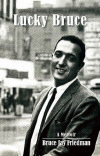Lucky Bruce
The title of Bruce Jay Friedman’s new “literary” memoir, Lucky Bruce, is an understatement. All the old adages about luck come to mind, you make your own luck, some are luckier than others, etc., but when you read Friedman’s life story you can’t help but agree: Bruce is one lucky guy.
The title of Bruce Jay Friedman’s new “literary” memoir, Lucky Bruce, is an understatement. All the old adages about luck come to mind, you make your own luck, some are luckier than others, etc., but when you read Friedman’s life story you can’t help but agree: Bruce is one lucky guy.
One of the foundations of Friedman’s “luck” is an incredible talent for writing. As the author of numerous novels, short stories, plays, essays and screenplays, Friedman now adds a memoir to his cache and provides a sweeping view of his creativity and life, beginning with his 1930s childhood in the Bronx and continuing to his present-day plateau. Along the way is a steady parade of anecdotes and name-dropping. Friedman admits throughout his book to this latter habit, so be prepared to mingle with a plethora of writers, directors, miscreants and hanger-ons from the 1940s onward. There is even a story about “crazy” Joe Gallo, whose dinner invitation Friedman turned down the night Gallo was assassinated at a clam house in Little Italy. Of course no contemporary literary memoir is complete without a fisticuffs episode with Norman Mailer. Friedman does not disappoint on this matter.
I’ve spent the last five years reading memoirs of tragedy. You name it—drug addiction, bi-polar episodes, schizophrenia and childhood abuse; you can find it all between two covers, and I have sought it all out. I like to see how people grapple with the hurdles in their own lives, but an occupational hazard of such research can be a cumulative depression during which you finally wake up one morning and yell: “I can’t read another tragedy!”
Lucky Bruce is an antidote to such tomes. It is breezy, engaging, informative and funny. If you want tragedy, find some other book. Friedman is now close to 80, and the evident focus of his memoir is to look back with fondness. Within in these pages are the stories of his life, his time in the Air Force during the Korean War (he made second lieutenant for his ability to write memos) and his literary apprenticeship to Air Training Magazine. Lucky Bruce decided to fire a story off to The New Yorker at this time and promptly forgot about it. Lo and behold, he then received a letter of his work’s acceptance, and he was off and running.
After the service, Friedman eventually landed a job with a magazine management company that oversaw the editing, production and creation of several publications. Friedman began as a caption writer and worked his way up to features, finally earning his own magazine (Swank, the pre-porno version, which crashed and burned). Here he met other writers just starting out, such as Mario Puzo and Terry Southern, and forged bonds that lasted a lifetime. On his own time, Friedman found the space to write his first novel, Stern, which made its way to publication and critical success. Lucky Bruce made it look easy. He published more short stories and his second novel, A Mother’s Kisses, before leaving the magazine company in 1965.
With no immediate prospects and a family to support, Friedman was suddenly awash in projects from Hollywood and even began writing his own plays, starting with Scuba Duba, which embarked upon on a successful theater run. It was this play that later sparked Friedman’s tussle with Norman Mailer. While at a party at Norman’s brownstone in Brooklyn Heights, Friedman ended up in a fight outside the building with the volatile author. At the time, Mailer’s own play, Deer Park, was not doing well, and he wasn’t handling his drinking either. He ended up shouting, “Scuba Duba sucks, Scuba Duba sucks!” while circling Friedman with punches. Lucky Bruce claimed eventual victory.
Through all the anecdotes, only fleeting mentions are made of failing marriages and trips to psychiatrists. Readers might glimpse a more personal view of his life from reading his novels. How much of Friedman is in Stern or Harry Towns, the hero of his later novel About Harry Towns? I’ll let a good biographer untangle that one. Friedman’s other books include the novels The Dick, The Current Climate, The Lonely Guy’s Book of Life, Tokyo Woes, A Father’s Kisses & Violencia; his recent nonfiction includes Even the Rhinos Were Nymphos and Sexual Pensees.
Friedman rounds out his publishing stories with tales from the film trade. His screenwriting credits are many, including Stir Crazy, Splash, Doctor Detroit, Fore Play and Steambath. For relaxation (while on the east coast), there are tales of Elaine’s restaurant for the literati on the upper east side of Manhattan. These stories could fill a chapter on pecking orders in a sociology textbook as the illustrious patrons vie for table positions. Heller, Truffat, Sinatra, Puzo, Plimpton and Mailer—again, still fighting, this time leaving a cracked wall after a scuffle with Jerry Leiber . . . they all left their scents in some manner in this eatery. It was the closest NYC ever came to Paris in the 1920s.
Friedman has few regrets looking back on his life. There is the time he turned down dining at Sinatra’s table at Elaine’s, and the Matisse he could have bought years ago for a cheap price. He also regrets not going to Harvard. I wish these were my regrets and after reading this book, and I suppose they are, vicariously.
Friedman ends one chapter with these words, an apt summation of an interesting life: “And always—no matter how weak the knees and frail the bank account—there has been the pleasure at customs of filling the blank for Occupation with the single word that has always felt treasured and benighted: writer.”





